 Petzlover
PetzloverBlack and Tan Terrier is originated from United Kingdom but Wetterhoun is originated from Netherlands. Black and Tan Terrier may grow 21 cm / 8 inches shorter than Wetterhoun. Black and Tan Terrier may weigh 24 kg / 52 pounds lesser than Wetterhoun. Both Black and Tan Terrier and Wetterhoun has almost same life span. Both Black and Tan Terrier and Wetterhoun has same litter size. Both Black and Tan Terrier and Wetterhoun requires Moderate Maintenance.
There is limited information on the Black and Tan Terriers since it is extinct. Black and Tan terrier came out of the “Terrier Wars” between the British and the Welsh in the late 1800’s. With dog shows on the rise, a race began to develop terriers that “belonged” to the Welsh or the British. The Black and Tan Terrier started out as the “Old English Broken-Haired Black and Tan”. The outrages Welsh responded with their first dog show filled with Welsh only terriers. There were 90 dogs at this first show. During this time, the British could not get their act together in respect to starting a club. Even agreeing on the name was difficult for them. Unfortunately, the dogs from both countries were not truly a “breed” but rather first-generation crosses between a wide variety of terriers. These terriers included breeds such as the Lakeland Terrier, the Welsh Terrier, the Patterdale Terrier, Fell Terriers, Border Terrier, Scottish Borders and the Manchester Terrier. The winner of that first dog show was a terrier cross between a Smooth Fox Terrier and a Border Terrier.
In 1885 both the Welsh and the British Black and Tan Terrier were featured. However, the English could not get the club together, so they were dropped from the Kennel Club Listings and only the Welsh Terrier was offered. The Black and Tan Terrier became extinct before 1900.
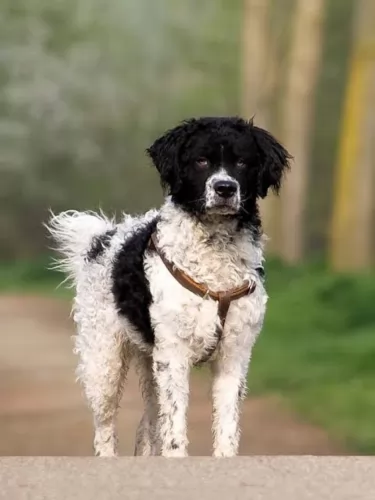 The Wetterhoun is a water dog developed in the 1500 or 1600s to hunt otters. The breed was developed by the Frisians in the Netherlands near the Northwest corner. In addition to catching otters in the lakes near by, they were also used as gundogs to hunt game. They are a fearless, tough and loyal working dog. They love the water and they are build for it with a waterproof coat and tight tail that is spiraled. They will swim happily in freezing cold weather as well.
The Wetterhoun is a water dog developed in the 1500 or 1600s to hunt otters. The breed was developed by the Frisians in the Netherlands near the Northwest corner. In addition to catching otters in the lakes near by, they were also used as gundogs to hunt game. They are a fearless, tough and loyal working dog. They love the water and they are build for it with a waterproof coat and tight tail that is spiraled. They will swim happily in freezing cold weather as well.
The Wetterhoun is rare and not seen outside of the Netherlands. Descendent of the Water Dog, that is now extinct, he is probably a relative of many spaniel types that also call the Water Dog their ancestor. Yet the Wetterhoun is not a spaniel or spaniel type.
The breed almost disappeared during World War II, like many others, they brought back and are now becoming more and more popular. The breed is only recognized by the Federation Cynologique Internationale and the United Kennel Club. AKC does not recognize them, but there are many hunting clubs and other registries that do. They are often promoted as one of the rare breeds.
The Black and Tan Terrier was an active, alert dog. A ratter as most terriers are. With a sleek coat, tan markings and thumbing, he was a handsome dog. Looks very much like the other terriers of his size and color with a truncated tail. He had small erect ears and a snout that was moderately elongated.
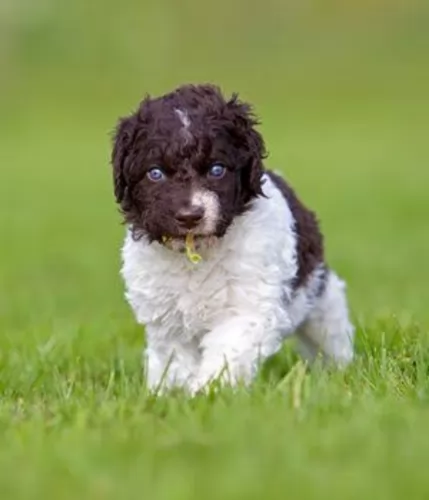 The Wetterhoun is a compact, medium sized breed weighing about 55 to 77 pounds. Great water dogs they are athletically built with low set ears hanging next to their heads, a waterproof coat, distinctive eyes with a very serious expression and a tightly curled tail held aloft over the back. Their coat is waterproof, somewhat oily, curly and thick. The fur is of a smoother texture on the ears, head, and legs. They can be solid black, solid brown, brown with white, or black with white.
The Wetterhoun is a compact, medium sized breed weighing about 55 to 77 pounds. Great water dogs they are athletically built with low set ears hanging next to their heads, a waterproof coat, distinctive eyes with a very serious expression and a tightly curled tail held aloft over the back. Their coat is waterproof, somewhat oily, curly and thick. The fur is of a smoother texture on the ears, head, and legs. They can be solid black, solid brown, brown with white, or black with white.
He was an alert and active dog. He was a good guard dog, an excellent ratter and a great family dog. He was affectionate, warm and gentle of the most alert and active of dogs, as game as a pebble, an ideal watchman, an unexcelled ratter and all done up in a small package. No dog exceeds him in beauty of outline, and this is enhanced by his sleek coat, with its sheen that the costliest satin does not possess; set off by the rich Tan markings, dainty penciling and thumbing that would puzzle an artist to reproduce. Information is limited on this extinct breed.
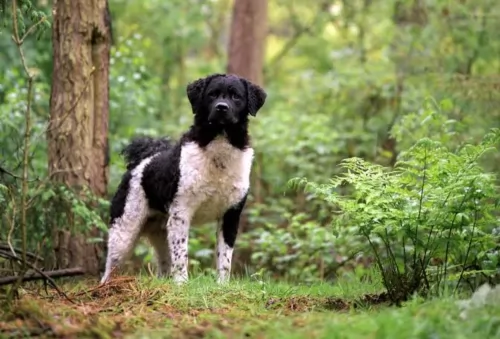 3.Adaptability – not a great apartment dog even though he is not that big. They need space. They need a job and they will finish their job at their own pace no matter what you say. It is impossible to train this trait out of them.
3.Adaptability – not a great apartment dog even though he is not that big. They need space. They need a job and they will finish their job at their own pace no matter what you say. It is impossible to train this trait out of them.
4.Learning ability Very high learning ability, very eager to learn and very smart. He is stubborn about finishing whatever job he is working on
The Black and Tan Terrier suffered from similar ailments as all terriers. He dealt with patella luxation (kneepads floating), skin allergies and eye issues. Because the breed is extinct there is little if any research on the health issues they might have experience before distinction
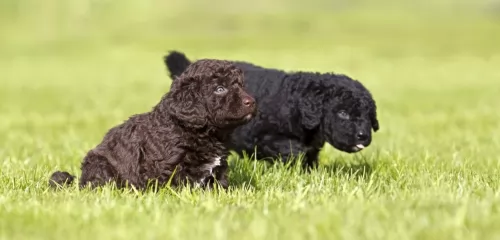 A hardy and healthy breed they do not have severe health issues. But like every his
A hardy and healthy breed they do not have severe health issues. But like every his
• Ear Infections – like any breed with hanging ears they can be prone to infection. This is particularly true because the dogs are in the water a lot. Be sure to clean and dry them after every water episode and inspect them on a regular basis even if the dog has not been in the water.
• Patellar Luxation – Knee cap issue with movement and inflammation. Can cause lameness and arthritis.
As you would with any terrier of his size 1-2 cups day.
The Black and Tan Terrier suffered from similar ailments as all terriers. He dealt with patella luxation (kneepads floating), skin allergies and eye issues.
The Black and Tan Terrier is in fact a terrier. He was a ratter and he needed intelligent exercise to keep him happy and non-destructive. Activities like barn hunt, agility and fly ball are perfect for this breed. A walk a couple times a day with a time for games is what was needed, and he would love to play ball with kids. They were very cuddly dogs as well.
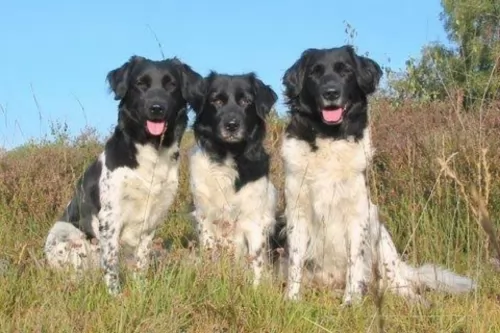 1Feeding the puppy -This is an active, hunting and swimming breed. They need good nutrition and high quality puppy food. A food formulated for active breeds or hunting dogs would be best. Feed your puppy in smaller amounts 3-4 times per day.
1Feeding the puppy -This is an active, hunting and swimming breed. They need good nutrition and high quality puppy food. A food formulated for active breeds or hunting dogs would be best. Feed your puppy in smaller amounts 3-4 times per day.
2.Feeding the adult - This is an active, hunting and swimming breed. They need good nutrition and high quality adult food. A food formulated for active breeds or hunting dogs would be best. Feed your adult twice per day.
4. Games and Exercises – This is an active working dog that needs a lot of exercise every day. A 30 minute walk is only the beginning. They need outdoor time to play and run. They need to swim if at all possible.